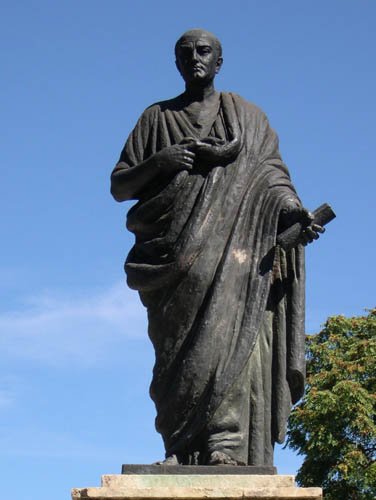I know it's wednesday, but I didn't have any time since sunday for a post about Seneca, so I will write one today and still call it senecasunday. Better late than never. ^^

(Image source: CC BY-SA 3.0, Link)
The photo is of a statue of Seneca in his birthtown Cordoba in modern day spain.
Like in the last posts, I will be taking a quote from Seneca's Letters to Lucilius. The quote is from a bilingual collection of philosophical writings by Seneca translated to german and edited by Manfred Rosenbach. The translation to english is my own, based mainly on the german text and partly on the latin text.
Today, the passage is going to be a bit longer, because Seneca describes quite eloquently something that a lot of people have to hear now just as much as 2000 years ago. Seneca is discussing, what kind of rules philosophers should give people concerning society and how human beings should treat each other:
| latin | german | english |
|---|---|---|
| Quae damus praeccepta? Ut parcamus sanguini humano? Quantulum est ei non nocere cui debeas prodesse! Magna scilicet laus est si homo mansuetus homini est. Praecipiemus ut naufrago manum porrigat, erranti viam monstret, cum esuriente panem suum dividat? Quando omina quae praestanda ac vitanda sunt, dicam? Cur dicam cum possim breuiter hanc illi formulam humani officii tradere? Omne hoc quod vides, quo divina atque humana conclusa sunt, unum est: membra summus corporis magni. Natura nos cognatos edidit cum ex isdem et in eadem gigneret. Haec nobis amorem indidit mutuum et sociabiles fecit. Illa aequum justumque composuit, ex illius constitutione miserius est nocere quam laedi: es illius imperio paratae sind juuandis manus. [...] Cohaereamus: in commune nati sumus; societas nostra lapidum fornicationi simillima est quae casura nisi invicem obstarent, hoc ipso sustinetur. | Welche Vorschrift geben wir? Dass wir schonen das Menschenblut? Wie wenig ist es, dem nicht zu schaden, dem du nutzen müsstest! Gewiss ist es großen Lob wert, wenn der Mensch glimpflich mit dem Menschen umgeht. Werden wir die Vorschrift geben, dass der einem Schiffbrüchigen die Hand ausstreckt, einem Irrenden den Weg zeigt oder mit einem Hungernden sein Brot teilt? Wann kann ich alles, was zu leisten und was zu vermeiden ist, aussprechen? Warum soll ich es aussprechen, obwohl ich ihm ganz knapp die folgende Regel der Menschenpflicht geben kann? Alles, was du siehst, darin Göttliches und Menschliches zusammengefasst, ist eine Einheit: Glieder eines großen Körpers sind wir. Die Natur hat uns als Blutsverwandte geschaffen, als sie uns aus demselben Stoff zu derselben Bestimmung zeugte. Sie hat uns gegenseitige Liebe eingepflanzt und uns zum Leben in der Gesellschaft befähigt. Sie hat Billigkeit und Recht geschaffen, nach ihrer Verfügung ist es erbärmlicher, zu schaden, als Schaden zu erleiden: nach ihrem Befehl sind die Hände zum Helfen bereit. [...] Seien wir solidarisch: für die Gemeinschaft sind wir geboren; unsere Gemeinschaft gleicht einem Bogen aus Steinen, der zusammenbräche, wenn die Steine einander nicht stützen würden, und eben dadurch wird der Bogen gehalten. | |
| What are the rules that we give? That we should not shed human blood? How little is it to not harm those that you should benefit! It is worthy of great praise when a man is kind to another man. Will we tell him to reach his hand to a shipwrecked man, to show a lost man the way or to share his bread with one who is hungry? When could I list everything that is to be done and everything that is not to be done? Why should I list all these things, when I can simple give him the following rule of all human affaires? Everything that you see, encompasing the divine and the human, is One: we are all limps of a single gigantic body. Nature created us from the same substance for the same goal. She gave us reciprocal love and the ability to live in a society. She created what is right and what is just; according to her decree it is worse to do harm than to suffer harm: according to her rules, the hands are ready to help. [...] Let us be in solidarity: we are born for the community; our community is like an arch made of stones that would crumble, if the stones wouldn't support eachother. And it is this support that lets the arch stand. |
From: Letters to Lucilius, book 15, letter 95.
TL; DR: In short, Seneca is telling us, that it isn't enough to not do any harm to our fellow human beings. We should be active and help each other. This is because everything in nature and society is part of a gigantice whole. Nature commands us to aid and be beneficial to each other, instead of harming each other and only thinking about ourselves.
If you look around, be it in real life or online, you will see a lot of people hating each other and causing others harm. When we stop doing that, it is a big steep in the right direction, but it isn't enough. We have to help each other, for we are all one. We are all part of a community and this is true for the "real" world just as much as for online communities such as this one.
Even shorter: when you see someone who needs help, lend a hand and be beneficial as much as possible.